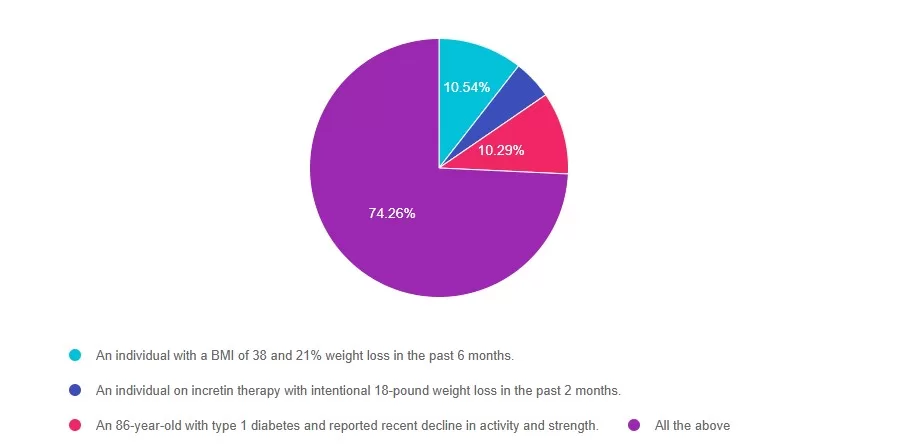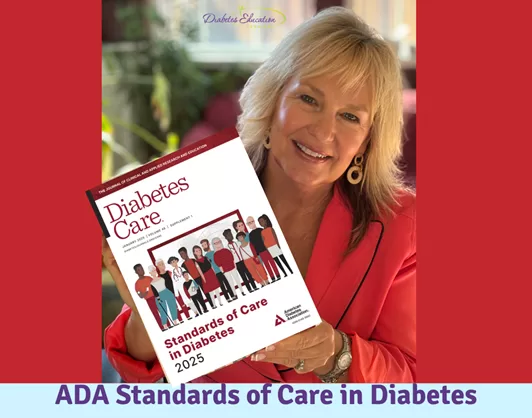For last week’s practice question, we quizzed participants on Diabetes & Malnutrition Risk 74.26% of respondents chose the best answer. We want to clarify and share this important information, so you can pass it on to people living with diabetes and your colleagues, plus prepare for exam success!
Before we start though, if you don’t want any spoilers and haven’t tried the question yet, you can answer it below: Answer Question

Question: The 2025 ADA Standards of Care have added recommendations for malnutrition screening.
According to these updated standards, who could be at risk for malnutrition?
Answer Choices:
- An individual with a BMI of 38 and 21% weight loss in the past 6 months.
- An individual on incretin therapy with intentional 18-pound weight loss in the past 2 months.
- An 86-year-old with type 1 diabetes and reported recent decline in activity and strength.
- All the above

Getting to the Best Answer
Answer 1 is incorrect. 10.54% chose this answer: “An individual with a BMI of 38 and 21% weight loss in the past 6 months”. Although Answer A is true, it is not the best answer. Malnutrition risk is not solely based on BMI. According to the 2025 ADA Standards of Care, individuals with diabetes experiencing significant weight loss, greater than 20%, may be at risk for malnutrition regardless of starting BMI.
Answer 2 is incorrect. 4.90% of you chose this answer: “An individual on incretin therapy with intentional 18-pound weight loss in the past 2 months.” This answer is also true, but there is a better answer. Even though the weight loss was intentional on incretin therapy, a rapid drop in weight, more than 4 kg/month, can still place an individual at risk for malnutrition. Monitoring nutrition status during weight loss pharmacotherapy is essential.
Answer 3 is incorrect About 10.29% of respondents chose this: “An 86-year-old with type 1 diabetes and reported recent decline in activity and strength”. This answer is true but not the best answer. Older adults, especially those with type 1 diabetes, are at greater risk for malnutrition, particularly when they experience declines in physical activity and strength. Malnutrition and sarcopenia, a loss of lean body mass, may develop simultaneously.
Finally, Answer 4 is correct. 74.26% chose this correct answer – GREAT JOB! All these scenarios indicate an increased risk of malnutrition and warrant additional screening. The ADA Standards of Care emphasize screening for malnutrition in individuals who have lost significant weight, especially individuals’ post-metabolic surgery, on incretin therapy, and individuals managing multiple chronic conditions who may experience an increased risk of developing sarcopenia and malnutrition. Check out the 2025 ADA Standards of Care Section 5 and Section 8 for the latest on malnutrition screening recommendations.
We hope you appreciate this week’s rationale! Thank you so much for taking the time to answer our Question of the Week and participate in this fun learning activity!
Want to learn more about this question?
Join us live on Jan. 30th for our
Standard of Care Course
Level 2

This course, updated annually, is an essential review for anyone in the field of diabetes. Join Coach Beverly as she summarizes the annual updates to the American Diabetes Association’s (ADA) Standard of Medical Care in Diabetes & provides critical teaching points & content for healthcare professionals involved in diabetes care & education.








